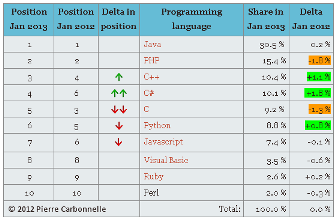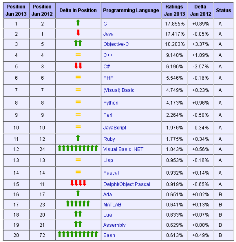Contributing writer
Picking a Programming Language to Study
Students often ask me which programming language they should focus on for their careers. It’s an interesting question with no easy answer. My first response is often, “It depends,” because there are so many options.
The Web
Students who want to focus on the Web can concentrate on Web design or Web development, or even better, both. Design students need to master HTML, CSS, and a graphics tool like PhotoShop. None of these are programming languages, so design is a good choice for students who like computers but don’t fancy coding. Web developers write server-side programs that typically interface with a database. Students with this interest should consider PHP, ASP.NET, C#, Java and SQL for working with databases. Both designers and developers should also learn JavaScript.
Non-Web Programming
There are many general-purpose computer programming languages to consider. Good choices include C/C++, C#, Java, Visual Basic, Python, and Ruby. However, new programming languages are appearing regularly and staying aware of new developments is a career-long responsibility.
Mobile Programming
This is a hot area and will continue to be so for some time. App developers are needed for Apple iOS, Android, and Windows Phone devices. Even BlackBerry, once thought to be dead in the water, is now coming back. iPhone apps are developed with the Objective-C language so students interested in this path should study the prerequisite, C++. An Apple computer is required, too. Android and BlackBerry apps are developed with Java. Students planning to develop Windows Phone 8 apps can prepare by studying .NET courses. There are also third-party development tools that can be used to create apps for all platforms. The best of these tools are not cheap.
Programming Language Indexes
Several indices available online will interest both budding and seasoned programmers. These sites attempt to rank the popularity of programming languages based on web searches, and they don’t always agree on all scales. The monthly Tiobe Programming Community Index is accessible at http://www.tiobe.com/index.php/content/paperinfo/tpci/index.html.
Popularity of Programming Language index at https://sites.google.com/site/pydatalog/pypl/PyPL-PopularitY-of-Programming-Language.
From PYPL PopularitY of Programming Language index and the Transparent Language Popularity index can be viewed at http://lang-index.sourceforge.net/.

Not Interested In Programming?
Students who enjoy working with computers but don’t like programming should investigate the CCIT areas of study at http://www.spcollege.edu/Computer_and_Information_Technology_Areas/

